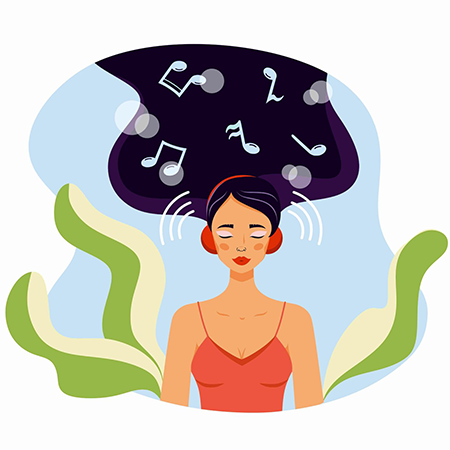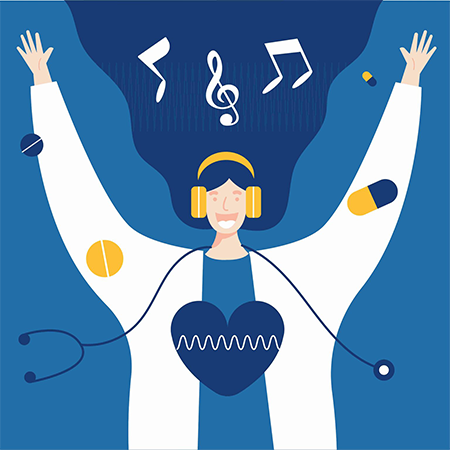Music & Wellbeing – a melodious dynamic
We’ve all had one of those days where all we feel like doing is laying down on the couch and just slipping on headphones to listen to some soothing music. Whether it’s been a hard day of work, or a rainy spell outside, or just a day where you feel like cutting off from reality, music comes as a welcome reprieve.
While music is most definitely a source of relaxation, it has a ton of psychological benefits as well. For instance, Music Therapy is widely used to help individuals cope with stress. Additionally, Classical music has a whole host of special benefits. Vocals, when mixed with a medley of instruments, can help boost cognitive abilities, and increase productivity by a significant extent. It also improves processing speed and impacts both long-term and short-term memory significantly. Today, experienced surgeons are using music in operation theatres, to put patients at ease and even improve their recovery rate.

Why does music have such an impact, might be a question that one might often ask?
Everything to do with music, the beats, the rhythm, the bass vibrations, the patterns, all have a distinct impact on the human nervous system. Classical music for example helps in releasing serotonin and dopamine, which are the chemicals required for a happy, mellow mood.
So why does music impact mental health so much?
Studies say that the effects of music often induce the production of endorphins in our body, which are primarily responsible for our well-being. It heightens emotional response and brings people together. Take concerts, for example. Anyone who attends a concert on any scale is left with the remnants of the musical notes echoing long after the concert ends. People spend any amount they can on a concert ticket for the rush that comes out of the event.
In most musical systems, the concept of learning music is segmented into two main parts- theoretical knowledge and practical learning. While theoretical knowledge improves cognition, memory and attention, practical learning helps improve dexterity, muscle memory and overall relaxes an individual. Children with learning disabilities function better when they are in an environment surrounded by music, experts say.
“While absorbed in tune, all else seems to disappear”, is an often-heard comment from people who use the aid of music to heal themselves from a difficult situation. Music has also proven to reduce the perceived intensity of emotional stress, which helps cultivate a desire to continue listening to the same tunes, causing any worry to dissipate instantaneously.

Music and Autism Spectrum Disorder
Why music?
Today’s world can be quite chaotic, and people have taken it on themselves to introduce music therapy into their lives. While the world has gone virtual, people have begun to take some time out everyday to learn a new artform, the most popular choice being music. E-learning modules and approaches to learning music, while not totally unfamiliar, have suddenly seen a massive spike. This is also due to two reasons, one, because society is slowly transitioning to a virtual medium since the pandemic, and two, after a long, tiring day, all one wants to do is unwind, relax, and disconnect from a harsh workday.
All this and more, is what makes music so crucial to our well-being, not just the fact that it can transport us to an entirely different world, but the fact that it can inherently change the environment that we exist in, immediately.
What’s better than having a perfectly tailored course to indulge in both some learning and self-care. Head on to The Pallikoodam and check out PaatuClass, which is a Singing Course customised to suit your preferences in music. Come aboard, and immerse yourself in music today!






